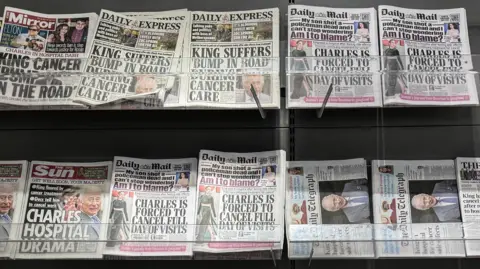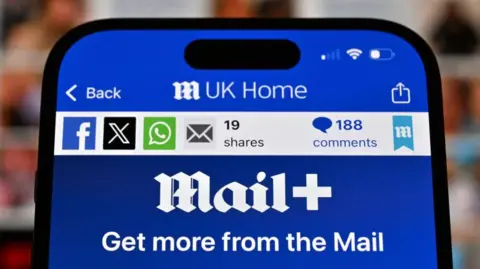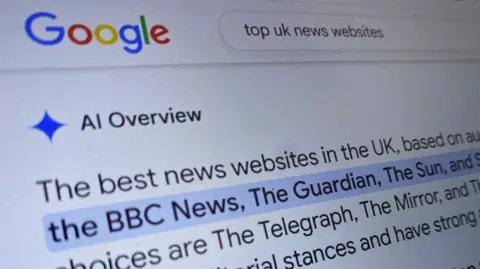Suzanne BearneTechnology Reporter
 Getty Images
Getty ImagesWhen actress Sorcha Cusack left the BBC drama Father Brown in January, it made headlines, including for the newspapers owned by Reach, among them The Mirror, and the Daily Express.
But the story did not generate the traction the Reach newspapers would have expected a year ago, or even at the start of the year.
Reach put this down to AI Overviews (AIO) – the AI summary at the top of the Google results page.
Instead of clicking through to the story on a Reach newspaper site, readers were happy with the AI overview.
The feature is a concern for newspapers and other media publishers, who have already seen much of their advertising revenue siphoned off by social media.
In a tough market, readers coming via Google search is a valuable source of traffic.
“A major worry, backed by some individual datapoints, has been that AI overviews would lead to fewer people clicking through to the content behind them, with negative knock-on effects for publishers,” says Dr Felix Simon, research fellow in AI and news at the Reuters Institute for the Study of Journalism, University of Oxford.
He points out that it’s hard to know the scale of the problem, as Google does not publish data on click-through rates.
DMG Media, owner of MailOnline, Metro and other outlets, said AIO resulted in a fall in click-through-rates by as much as 89%, in a statement to the Competition and Markets Authority made in July.
It means publishers are not being fairly rewarded for their work, says David Higgerson, chief digital publisher at Reach.
“Publishers provide the accurate, timely, trustworthy content that basically fuels Google, and in return we get a click… that hopefully we can monetise to our subscription service.
“Now with Google Overviews it’s reducing the need for somebody to click through to us in the first place, but for no financial benefit for the publisher.”
“It’s another example of the distributor of information not being the creator of information but taking all the financial reward for it.”
There is also concern over Google’s new tool called AI Mode, which shows search results in a conversational style with far fewer links than traditional search.
“If Google flips onto full AI Mode, and there is a big uptake in that…that [will be] completely quite devastating for the industry,” says Mr Higgerson.
 Getty Images
Getty Images“We are definitely moving into the era of lower clicks and lower referral traffic for publishers,” says Stuart Forrest, global director of SEO digital publishing at Bauer Media.
“For most of the last decade Google has introduced more and more features into the SERP [Search Engine Results Page], which reduces the need for consumers to visit a website. That is the challenge that we as a sector face.”
Mr Forrest says he hasn’t noticed a drop in traffic across Bauer’s sites, which include brands Grazia and Empire, as a result of the overview feature. But that could change.
“I absolutely think that as time goes on, as consumers get used to these panels, it’s without doubt going to be a challenge. We are absolutely behaving as if we have to respond to that threat.”
In its defence, a Google spokesperson said: “More than any other company, Google prioritises sending traffic to the web, and we continue to send billions of clicks to websites every day.
In an August blog post, Google’s head of search Liz Reid said the volume of clicks from Google search to websites had been “relatively stable” year-over-year.
She also said the number of quality of clicks had improved slightly compared to a year ago – quality clicks are when a user does not immediately click back from the link.
“With AI Overviews, people are searching more and asking new questions that are often longer and more complex. In addition, with AI Overviews people are seeing more links on the page than before. More queries and more links mean more opportunities for websites to surface and get clicked,” she said in the blog.

Some in the publishing industry are turning to the courts for redress.
In July, a group of organisations including the Independent Publishers Alliance, tech justice non-profit Foxglove, and the campaign group Movement for an Open Web filed a legal complaint to the UK’s Competition and Markets Authority alleging that Google AI Overviews is using publishers’ content at a cost to the newspapers.
It is asking the CMA to introduce interim measures to prevent Google from “misusing” publisher content in AI-generated responses.
In the meantime publishers are trying to understand how to feature in AIO and hopeful win some click-throughs.
“Google doesn’t give us a manual on how to do it. We have to run tests and optimise copy in a way that doesn’t damage the primary purpose of the content, which is to satisfy a reader’s desire for information,” explains Mr Higgerson.
“We need to make sure that it’s us being cited and not our rivals,” says Mr Forrest. “Things like writing good quality content… it’s amazing the number of publishers that just give up on that.”
Like other publishers, Reach is looking at other ways to build traffic to its news platforms.
“We need to go and find where audiences are elsewhere and build relationships with them there. We’ve got millions of people who receive our alerts on WhatsApp,” Mr Higgerson says.
“We’ve built newsletters. It’s all about giving people what they want when they’re on our website and our brand, so the next time they’re looking, hopefully they aren’t going to a third party to get to us.”


